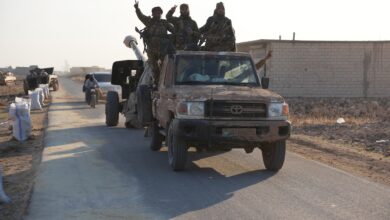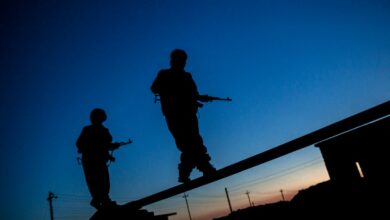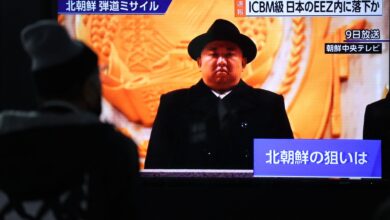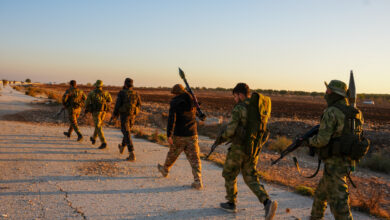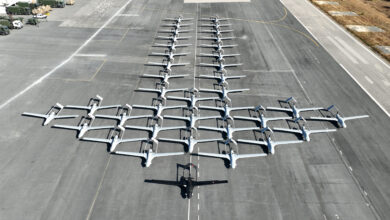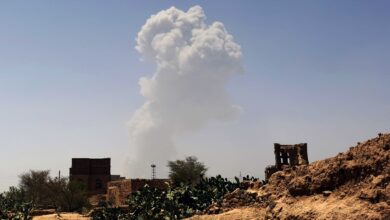Military escalation in Syria’s Idlib province tests Turkey’s resolve
Turkey is warning the Syrian government not to “play with fire” following a strike on one of its military convoys and the regime’s advance on a major rebel holdout in southern Idlib province.
As troops loyal to Syrian President Bashar al-Assad closed in on Khan Sheikhoun, the U.K.-based Syrian Observatory for Human Rights and local activists reported Tuesday, August 21 that rebel forces had withdrawn from the town.
For the Syrian government, Khan Sheikhoun is of strategic significance. It sits on the M5 highway, which links the large northern city of Aleppo to the capital of Damascus, and has been used as a major rebel supply route.
Earlier in the week, airstrikes targeted a Turkish military convoy near the city of Maarat al-Numan. Syria’s state-run news agency SANA quoted a foreign ministry source who said the convoy was supplying weapons to “terrorist groups” in Khan Sheikhoun.
But according to the Turkish defense ministry, the convoy was headed to resupply a military observation post, one of 12 Turkey installed around Idlib as part of a de-escalation agreement reached with Russia last September.
Turkey, which supports some of the opposition groups fighting Assad, denounced the attack on its convoy.
“The Assad regime needs to not play with fire. We will do whatever it takes to secure our troops,” Turkish Foreign Minister Mevlut Cavusoglu told reporters Tuesday.
Aaron Stein, the director of the Middle East Program at the Foreign Policy Research Institute, says this latest escalation shows the Turkish outposts in Idlib have proven strategically useless.
“The regime is sort of its own animal and decided it was ready to go,” Stein said. “They began this offensive for Idlib despite the presence of the observation posts.”
“Whatever deterrent value the observation posts had – or if they ever had – has evaporated to the point of being symbolic.”
After eight years of war, Idlib is the last major part of Syria under the control of the opposition. The northwestern enclave bordering Turkey is home to roughly three million civilians, many of them displaced by fighting elsewhere in the country.
The area is also a jihadist stronghold, and is dominated by al-Qaida-linked Hayat Tahrir al-Sham.
For months, Idlib province has witnessed heavy fighting despite the truce reached by Turkey, Iran and Russia. Under the deal, Turkey was to ensure jihadist groups and heavy weaponry withdrew from a demilitarised buffer zone in Idlib.
Assad accused Turkey and the opposition of failing to comply and used that as justification to launch a military offensive in late April.
“Russians are attacking Idlib under the pretext of fighting terrorism. In reality, they have targeted and are targeting moderate groups,” Major Youssef Hamoud, spokesperson for the Turkey-backed National Army, told The Defense Post.
The regime’s months-long bombing campaign in Idlib and northern Hama provinces has left some 500 civilians dead and forced at least 400,000 people to flee toward the closed Turkish border, according to the United Nations.
A wave of Russian and Syrian airstrikes have hit hospitals, schools and residential areas in what rights groups say amounts to war crimes. Both Syria and Russia deny targeting civilians.
Until recently, pro-government forces had made slow progress retaking Idlib province. But months of fighting has taken a toll on the opposition.
“The attrition rates are immense. Some units are entirely destroyed,” said Elizabeth Tsurkov, Research Fellow at the Forum for Regional Thinking.
The regime, meanwhile, has managed to rotate fresh, newly trained units onto the battlefield, according to Tsurkov, who closely watches the situation in Idlib. Pro-government forces are also now using night-vision equipment, allowing them to advance both day and night.
“Now the regime is stronger and more resurgent,” said Tsurkov. “The question is now basically whether Russia will pull back the regime after it feels victorious.”
“Clearly the regime desires to take over all of Idlib. It does not care if it needs to kill everyone in the process.”
The U.N. has warned any further push into Idlib risks generating the worst humanitarian disaster of the century.
“We are looking at a potential explosion of another massive exodus,” said Dima Moussa, the vice president of the Syrian National Coalition, an opposition umbrella group.
Nearly half a million people have fled their homes in recent months. With Turkey’s heavily militarized border shut to refugees, many have taken shelter in olive groves outdoors or in overcrowded, unsanitary displacement camps.
“These people have nowhere else to go from here,” said Moussa. “There is no other ‘Idlib.’ This is it.”




